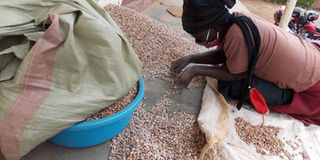Helping smallholder farmers get quality seeds

A woman sorts out bean seeds before they are distributed to the farmers. PHOTO | MICHAEL J. SSALI
What you need to know:
- The farmers plant the seeds in their gardens under the guidance and supervision of an extension worker and after harvesting the farmers keep some of the beans for their own consumption and sell the rest.
Most of our smallholder farmers face the challenge of increasing agricultural production in order to improve their incomes and to feed the ever-growing population.
Yet due to land fragmentation caused by more people scrambling for some share of the available space, the gardens are getting smaller as the soil becomes overworked and depleted.
Climate Change
The onset of Climate Change has not helped matters since it has come along with extreme weather conditions as another resource, water, is decreasing due to unabated wetland encroachment and deforestation.
Such a situation calls for an urgent need to provide farmers who are more than 70 percent of Uganda’s population with knowledge, strategies, and inputs to increase agricultural productivity and incomes. It is not easy for the majority of farmers to access the needed technology and inputs mainly due financial constraints.
However some organisations have found their way around this and are taking both the technology and inputs directly to the farming communities through such arrangements as contract farming.
Contract farming
Charles Mukasa Mutyaba of Kyandaaza Village, Byakabanda Sub-county, Rakai District is among the farmers who are into contract farming.
When Seeds of Gold visited him he pointed at the bags of beans in his small store hardly thinking about the cost of the quality seeds that he planted and the guidance he received in order to come up with such high yields.
He disclosed that he had been growing beans since 2013 together with other farmers in the village because he is sure of the good yields and a ready market. All the farmers in his group have the seeds delivered to them by Community Enterprises Development Organisation (CEDO) on credit.
The farmers plant the seeds in their gardens under the guidance and supervision of an extension worker and after harvesting the farmers keep some of the beans for their own consumption and sell the rest to CEDO in an arrangement known as contract farming.
Benefits
Mutyaba says, “I have found the arrangement with our seed suppliers so good. As farmers we don’t have to travel long distances to buy the seeds. We don’t have to worry about paying cash for the seeds. We also get some agronomic skills through hands-on training provided by their extension staff members that make periodic visits to our gardens.”
Similar sentiments were shared by Winnie Nakimuli, a bean farmer in Rakai District at whose garden fellow farmers periodically meet to pick new farming technologies. During a farmers’ field day late last year she emerged as the area model farmer.
She attributed her success to good ground preparation, planting of good quality seed, fertiliser application and timely weeding.
On their own the farmers were able to tell which bean varieties had performed better and thus learning the advantages of choosing to plant quality seeds.
Another farmer, Maxencia Nambajo, coordinator of Sossolya Bwatafa Farmers Group near Kalisizo Town in Kyotera District told Seeds of Gold: “When we participate physically in the work on the demonstration garden, right here on our village, to test the qualities of improved seeds from NARO, we are in a better position to make informed decisions about what seed varieties to grow. We also learn what to do in order to come up with good harvests.”




